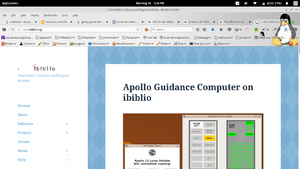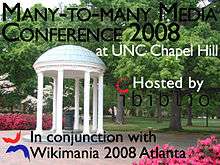ibiblio
ibiblio (formerly SunSITE.unc.edu and MetaLab.unc.edu[2]) is a "collection of collections," and hosts a diverse range of publicly available information and open source content, including software, music, literature, art, history, science, politics, and cultural studies. As an "Internet librarianship," ibiblio is a digital library and archive project. It is run by the School of Information and Library Science and the School of Journalism and Mass Communication at the University of North Carolina at Chapel Hill, with partners including the Center for the Public Domain, IBM, and SourceForge.[3] It also offers streaming audio radio stations. In November 1994 it started the first internet radio stream by rebroadcasting WXYC, the UNC student-run radio station. It also takes credit for the first non-commercial IPv6 / Internet2 radio stream. Unless otherwise specified, all material on ibiblio is assumed to be[4] in the public domain.
 | |
 ibiblio on Firefox 47 | |
Type of site | Digital library and archive |
|---|---|
| Available in | Multilingual, but predominately English |
| Owner | University of North Carolina at Chapel Hill |
| Created by | University of North Carolina at Chapel Hill and Sun Microsystems |
| URL | ibiblio.org |
| Alexa rank | |
| Commercial | No |
| Registration | Optional |
| Launched | ca. 1992 |
| Current status | Online |
ibiblio is a member of the Open Library and Open Content Alliance.
History
In 1992, the University of North Carolina at Chapel Hill developed SunSITE.unc.edu, which was to be an archive and an information sharing project for the public. It was funded by grants from Sun Microsystems, and thus the name. The relationship with Sun came to an end (an amicable one, according to the ibiblio FAQ; the change in name was for a "vendor-neutral name that expressed what our project has evolved into over the years"[5]) and the name was changed to MetaLab. It collaborated with various sources, including academic institutions, corporations, and information technology entrepreneurs.
Also in 1992, sunsite.unc.edu became one of the first web sites on the internet. Today, it is still the host for a copy of the oldest web page known in history.[6]
In September 2000, MetaLab began to collaborate with the Center for the Public Domain; the name was changed to ibiblio to reflect the goal of being "the public's library and digital archive."
| 2002[7] | 2006[7] | 2008[8] | |
|---|---|---|---|
| Collections | 800 | 1600+ | 2500+ |
| Visits (ftp+www/day) | 3 million | 15+ million | 16+ million |
| Data (terabytes) | 1 | 8 | 13 |
| Web servers | 1 large, 2 peripherals | 22 www/vhosts | 25 www/vhost servers |
| Database servers | 2 | 5 | 7 |
| Radio stations | 4 | 7 | 6 |
Currently supported projects
- Cafe au Lait[9] (Hosted)
- Damn Small Linux (Hosts MyDSL)
- Degree Confluence Project (Hosted)
- Eric S Raymond (Hosted)
- etree (Hosted)
- FreeDOS (Files archive)
- Friends of Tibet[10] (Hosted)
- GPGPU (General-Purpose Computation Using Graphics Hardware)[11] (Hosted)
- Groklaw (Hosted)
- Linux Documentation Project (Began at MetaLab)
- Lyceum (ibiblio-run software research project)
- Openphoto.net (Hosted)
- Osprey[12] (ibiblio-run software research project)
- Project Gutenberg (Hosted)
- Puppy Linux (repositories)
- Tempora Heroica (Hosted)
- Tiny Core Linux (Hosted)
- Videobloggers (Hosted)
- World Tibet Day[13] (Hosted)
- Yggdrasil Linux (Historical archive)
See also

References
- "ibiblio.org Competitive Analysis, Marketing Mix and Traffic - Alexa". ibiblio.org. Retrieved May 27, 2020.
- Collaboration and Cooperation. Ibiblio.org (June 14, 2007). Retrieved on 2010-09-29.
- "Who are your major contributors/partners?". FAQ. ibiblio. Retrieved June 25, 2008.
- "Home to one of the largest "collections of collections" on the Internet, ibiblio.org is a conservancy of freely available information, including software, music, literature, art, history, science, politics, and cultural studies". about. ibiblio. Retrieved February 18, 2009.
- ibiblio FAQ, "Why did you change names from SunSite to MetaLab? Why did you change the name from MetaLab to ibiblio?." Chapel Hill, North Carolina, U.S.A.
- "The first Web page is lost – oldest copy found on Paul Jones' NeXT Cube – available on ibiblio all along". ibiblio.org. June 3, 2013. Retrieved October 10, 2014.
- "2006 of ibiblio". ibiblio.org. 2006. Retrieved August 21, 2008.
- "2007–08 of ibiblio". ibiblio.org. 2008. Retrieved August 21, 2008.
- Cafe au Lait Java News and Resources. Cafeaulait.org. Retrieved on 2010-09-29.
- People's Movement for an Independent Tibet. Friends of Tibet. Retrieved on 2010-09-29.
- General-Purpose computation on Graphics Processing Units Archived December 14, 2005, at the Wayback Machine. GPGPU.org. Retrieved on 2010-09-29.
- Osprey | Peer-to-peer enabled content distribution. Osprey.ibiblio.org (February 22, 1999). Retrieved on 2010-09-29.
- welcome to world tibet day website. Worldtibetday.org. Retrieved on 2010-09-29.